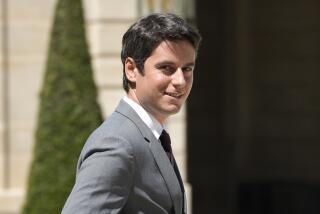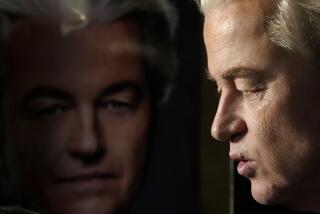Germany’s Angela Merkel begins tricky task of forming new government

LONDON -- Fresh from her party’s best election showing in more than 20 years, German Chancellor Angela Merkel started the tricky task Monday of forming a new government after her preferred coalition partner was ousted from parliament in a shocking result.
Merkel’s jubilation over winning a third term as chancellor, which would extend her time in power to 12 years, gave way to the political reality that she still needs to find a junior party with which to govern. Despite garnering far more votes than that of any other group, Merkel’s center-right Christian Democratic Union fell five seats short of a majority in the Bundestag.
Still, the strong performance emboldened Merkel to claim a mandate and to dismiss speculation that she might soften her approach to managing Europe’s long-running debt crisis. Ailing neighbors such as Spain and Greece, where more than half of all young people are out of work, have pleaded with Germany to ease its demand for unremitting austerity in exchange for financial help, but Merkel signaled that there would be no let-up.
“Our European policy course … will not change,” she said.
Germans generally credit Merkel with protecting them from the ill effects of the debt crisis. The fact that their economy, Europe’s largest, continues to grow and that unemployment has dwindled to near-record lows has fed a sense of well-being and satisfaction with Merkel’s leadership.
But she may yet have to relent on some issues at home in her search for a coalition partner. Her Christian Democratic Union, or CDU, was virtually the only conservative party left standing after Sunday’s election. In a stunning development, the pro-market Free Democrats, with whom Merkel has governed for the last four years, failed to clear the 5% vote threshold required to enter parliament, shutting them out of the Bundestag for the first time in more than 60 years.
Instead, Merkel will have to try to persuade either the left-leaning, second-place Social Democrats or the smaller Green Party to join her in government. The Social Democrats, which participated in a “grand coalition” during Merkel’s first term, are likely to insist that she moderate or drop her opposition to a national minimum wage or higher taxes on the rich.
“You’ll have to ask [the CDU] whether it’s ready to pay a price,” the Social Democrats’ party chairman, Sigmar Gabriel, told reporters. “The ball is with Merkel.”
Negotiations to form a new government could last weeks. In 2005, the CDU and the Social Democrats took two months to reach an agreement on governing together.
“Thoroughness goes before speed,” Merkel said of the talks -- a statement that also neatly sums up her leadership style.
If she completes another full four-year term, Merkel would eclipse the late Margaret Thatcher, Britain’s former prime minister, as Europe’s longest-serving female leader. Merkel, 59, would also become Germany’s longest-serving chancellor since Helmut Kohl, her onetime mentor, whom she turned against and replaced as leader of the CDU in 1998.
ALSO:
What to look for when President Obama goes to the U.N.
Kenya mall attack: Two terrorists killed as siege nears end
Egyptian court bans Muslim Brotherhood, orders its assets confiscated
Twitter: @HenryHChu
More to Read
Start your day right
Sign up for Essential California for news, features and recommendations from the L.A. Times and beyond in your inbox six days a week.
You may occasionally receive promotional content from the Los Angeles Times.







